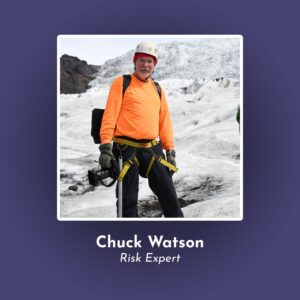
Show Summary
On this special episode, risk analyst Chuck Watson returns to discuss the current state of the conflict in Ukraine and the potential for escalation. With the conflict centered around resource control, cultural clashes, and political posturing – will European countries now push to keep the United States involved with the conflict? More, are we seeing the full picture from the perspective of western media? Who is really winning this ‘open secret war’ and what is the context behind the various realities of the players in this conflict? Are there still peaceful, stable options that maneuver us away from open war and what would those mean for the rest of the world?
About Chuck Watson
Chuck Watson has had a long career in military and intelligence work, with a specialty in natural and human made disaster modeling. He worked for the US Air Force, was an attache to US Ambassadors to the Middle East Robert McFarland, and Secretary of Defense Donald Rumsfeld as a Soviet expert. Chuck has worked as an advisor to the military for over four decades with a particular emphasis on big data, open source intelligence, with an emphasis on the Soviet Union and Russia. Chuck is also the founder and Director of Research and Development of Enki Holdings, LLC, which designs computer models for phenomena ranging from tropical cyclones (hurricanes) and other weather phenomena, earthquakes, and tsunamis, as well as anthropogenic hazards such as industrial accidents, terrorism, and weapons of mass destruction.
In French, we have a motto that says that a simple drawing is often better than a long explanation. Jean-Marc Jancovici Carbone 4 President
That’s very understandable because with left atmosphere thinking, one of the problems is that you see everything as a series of problems that must have solutions. Iain McGilchrist Neuroscientist and Philosopher
We can’t have hundreds and hundreds of real relationships that are healthy because that requires time and effort and full attention and awareness of being in real relationship and conversation with the other human. Nate Hagens Director of ISEOF
This is the crux of the whole problem. Individual parts of nature are more valuable than the biocomplexity of nature. Thomas Crowther Founder Restor
Show Notes & Links to Learn More
Download transcript00:00 – Chuck Watson Info, Past Episodes
01:22 – Death toll in Russia/Ukraine
01:42 – Poland and other countries statements about moving into Ukraine
05:59 – Putin State of the Union
06:10 – Ukraine territorial history
07:56 – Resources in Ukraine
08:55 – Russia aiding African countries affected by European colonization, China benefits
10:30 – Political history in Eastern Europe
12:59 – Attempt at peace in Russia/Ukraine and UK’s influence
14:14 – History of colonization and resources in France
15:31 – France and uranium resources
16:40 – Wagner Group
17:23 – French Legionnaires in Russia
19:10 – Civilian opinion of statehood status in Ukraine
19:27 – Oleksandr Syrskyi
20:00 – Chuck’s clarifying comments on casualty figures (Written 3/16/24)
26:12 – 2014 Ukrainian Revolution
27:48 – Auroville
32:27 – Russia buying North Korean artillery
33:23 – Victoria Nuland, John Bass
33:40 – Lindsey Graham, changing position on Ukraine
36:20 – NATO Treaty, Article 5
39:13 – Archduke Ferdinand
39:37 – The U.S. is at war with Russia under international law
40:55 – Governance structure in Russia
41:38 – The current geopolitical state of France
45:20 – Partitioning Ukraine is Russia’s desired outcome
48:32 – Omar Bradley
51:17 – Resources from Russia are still making it to Europe, with a middle man
52:15 – Sanctions being waived
52:51 – Reagan, Trust but Verify
54:01 – Sting – Russians
More: A Russia-NATO conflict is just one step from WW3, Putin warns the West | Arab News







